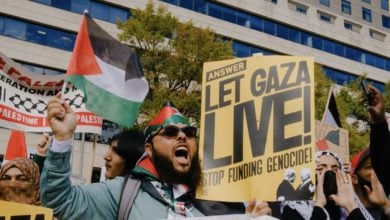Reprinted from the ANSWER Coalition website.
‘We won’t let anyone turn us around’ |
Iraq war veteran and ANSWER Coalition representative Michael Prysner reports on the Viva Palestina delegation’s journey to challenge the Israeli blockade of Gaza and deliver humanitarian supplies.
In the past several months, the ANSWER Coalition has organized several rallies, marches and demonstrations in support of the Palestinian struggle, and sent representatives to Gaza as part of a humanitarian aid delegation. We can’t do it without your help! Your financial contribution is urgently needed. You can make a contribution through a secure server by clicking here, where you can also find information on how to contribute by check. |
But when we arrived at the checkpoint, the Egyptian authorities had been waiting for us, and immediately directed us to a side road which was barricaded. They were given orders to not let us pass no matter what. They persistently attempted to turn us around back to Cairo.
At this checkpoint, however, we were not even crossing any borders. We were simply trying to move about freely within Egypt, from one province to another, a right granted to U.S. citizens in the country. We, of course, refused to turn around.
After three hours of negotiations, the authorities showed no signs of budging. They would give us no explanation why they would not allow us to cross. We all exited the buses and began chanting in support of the Palestinian people.
Failing to bully us, the Egyptian police began threatening the bus drivers with fines and arrest, and demanding that they turn the buses around. A police arrest wagon rolled in, along with riot police, obviously threatening arrest, but we were not intimidated.
Our delegation stayed strong throughout the night. The Egyptian police physically assaulted Viva Palestina members several times, shoving young women and grabbing young men. Each time, the entire force of the contingent stood up to the police.
A wave of press began to cover the unfolding confrontation. We were interviewed by international media.
As the sun began to rise, with all of us camped out around the buses, the police suddenly said we could cross. We all loaded in, believing the ordeal had ended. Our excitement did not last long: as soon as the vehicles began to move we realized that it was a trick. The buses were being directed back to Cairo. We jumped off the moving buses and blocked their path with our bodies.
Throughout the entire conflict, Councilmember Barron was on the phone with the State Department, the White House, the U.S. Embassy and other officials. Many other delegation members called the Embassy describing the events.
By about 9:30 a.m., we had reached a stalemate. Nobody in the Embassy, foreign ministry or State Department would request that we be let through.
After nearly 12 hours of negotiating with the Embassy, we were informed that we would be allowed to pass if we completed some additional paperwork—which the Embassy claimed was required from the beginning, yet without ever bringing that to our attention prior to this point.
We have now met up with British MP George Galloway, former U.S. Congressional Representative Cynthia McKinney, and Dead Prez rapper M-1 back in Cairo. Galloway confirmed that we had complied with all of the Egyptian government’s requests several times over; the new requirements were bureaucratic hoops meant to stall our caravan. Galloway said, “If the Egyptian authorities want us to jump through yet another hoop, we will.”Our plan is to return to the same checkpoint tomorrow with over 50 vehicles and 170 people strong.
Standing together were teenagers as young as 17 and seniors in their 70s, people of every religion, from a multitude of nationalities, speaking nearly 10 different languages, and encompassing a wide range of political experience. Several in the group only recently joined the Palestine solidarity movement after the December 2008/January 2009 Israeli massacre in Gaza—a massacre appalling for its brutality. The ability of the Palestinian people in Gaza to remain steadfast in the face of this has in turn inspired solidarity from people all over the world.
The Viva Palestina convoy expects progress on all fronts tomorrow and is calling on sympathetic organizations to mobilize their networks and stand ready for action.
To read Michael Prysner’s complete reports, click here.
Michael Prysner joined the U.S. Army when he was 17 years old, hoping that he would get a college education and, in his own words, “believing that the U.S. government stood for freedom, justice and equality.” Prysner was later deployed as part of the initial invasion of Iraq. Of his experience, Michael wrote: “I spent 12 months in Iraq, doing everything from prisoner interrogations, to ground surveillance missions, to home raids. It was my first-hand experiences in Iraq that radicalized me. I soon realized that my purpose in Iraq was to be the oppressor, and to clear the way for U.S. corporations with no regard for human life. “I separated from the Army in 2005. I understood that illegal conquering of Iraq was for profit, carried out by a system that serves a tiny class of super-rich whose endless drive for wealth is at the expense of working people in the United States and abroad. “I still had the same drive to fight for freedom, justice and equality as I did when I joined, and I understood that fighting for those things meant fighting against the U.S. government, not on behalf of it.” |
Funds are Urgently Needed |
Funds are urgently needed to help build the struggle for a free Palestine. We can’t do it without your help. You can make a contribution through a secure server by clicking here, where you can also find information on how to contribute by check.









